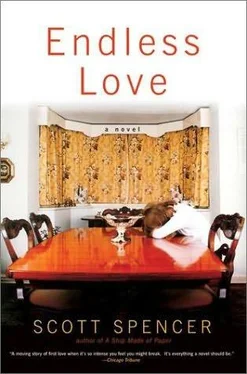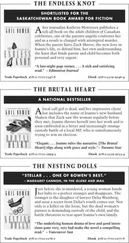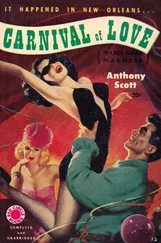We were silent while the dead who lived in my father’s thoughts passed through him: with leaflets, with saxophones.
Finally, I asked, “When are you leaving…?” Leaving where? Home seemed childish and Rose an accusation.
“Tonight,” said Arthur.
“Mom knows?”
“She knows.”
“I mean she knows it’s tonight?”
“Yes. And she’s known the whole thing for a long while. We waited.”
“Because of me?”
“We wanted you to get settled. To feel strong in your own life. We didn’t want you in that hospital thinking you didn’t have a normal home to come home to.”
“You’ve been thinking about it that long?”
Arthur nodded.
And then I said what I’d known all along. “Are you in love with someone else?”
Arthur was immobile for a moment, and then he said, in that kind of voice men use when they recite oaths, “With all my heart.”
“Who is it? Is it someone I know?”
“You never met her. Her name is Barbara Sherwood. She works as a court stenographer. You know that’s a very good job and a very difficult one. She’s been married. Her husband died five years ago. She lives in our neighborhood. Two children. And she’s black.”
I folded my hands. “Are you moving in with her?”
“I’ll stay at her house in the meanwhile. Barbara’s in the hospital right now. I’ll help look after the kids and after she gets out we shall see.” He poured the last of the beer into our glasses. Most of the food was still on his plate; it had been cut and pushed around, as if he’d been looking for something inside of it.
“I don’t blame you, you know,” I said. “I don’t think that’s a big issue or anything, but I want to tell you I don’t blame you for doing this.”
“It’s what I would expect,” said Arthur. “You of all people.”
“Wait. Don’t say that. I love Mom. I don’t care what it looks like. Our relationship is what we’ve made it but I’m always going to love her.”
“I know that. That’s not what I mean. You of all people know what it’s like to be so much in love that everything else falls away. Everyone else I know would probably think I’m acting like a bastard or just an idiot. Leaving Rose. Leaving behind all those years. You know a man my age has more of a past than a future, and when you leave the past you only have a few years to call your own. They’d think I was acting irresponsibly. People believe in our marriage, Rose’s and mine. Did you know that?”
“No.”
“They do. Of course, no one knows what’s happened. And when they find out, they’ll all regroup around Rose. I’ll be the villain. They’re really her friends anyhow, always have been. The old comrades. In a lot of ways, I was sick of that crew ever since I got back from the war.”
“When I was born.”
“They’re not going to understand, but you are. I guess a father has no business saying this to a son, no matter how old the son is.” His gaze passed over me, as if I was just one member of an enormous jury. “You were my inspiration. Seeing you in love reminded me.”
“Of what?”
“Of how I once felt about Rose and how she never ever felt about me, until I didn’t feel that way about her either. But you reminded me of how it feels. A lot of people never have it, that feeling, not even once. You know that, don’t you? But you had it—”
“With Jade.”
“And you reminded me that I once had it and that I never felt so large and important as I did when being in love was everything. I saw you walking a foot above the earth and I remembered that was where I used to walk, for a few months. Right after I helped Rose get her divorce and we were together every minute of the day. Before it came out how much she was in love with that Courtney and I had to realize it was going to take a while for her to get over it. I knew she’d get over it but it was going to take time. The magic in her heart was with him, not with me, even though she would have chosen me over him a hundred times. I understood that, but I wasn’t walking in the air anymore. I had to be too intelligent for that; you make a few reasonable decisions and you can’t make a fool of yourself any longer.”
“I never knew that’s what you wanted.”
“I didn’t either. I’d forgotten. You made me remember and then Barbara showed me I hadn’t missed my chance. It was like waking up twenty years younger. Not that all of a sudden my hair was thick and I didn’t need glasses and my death was far away. But I have an appetite for every single second of the day. I want you to meet Barbara. You’re going to know what I mean. I never thought this would happen. I never thought I’d be able to believe in all of this a second time. But I do. And I don’t have to be embarrassed.”
“I know,” I said. My heart was pounding.
“I know you know. You know it every second of your life and you won’t let yourself forget. It’s why you sneaked out of the house that night of your party to go to my office. And it’s why every time you come to my office to meet me for lunch you manage to take a look at those letters of yours and it’s why I always make sure to let you.”
Barbara Sherwood was in the same hospital I was taken to after the fire and the room she occupied was next door to the room in which I confessed—insisted—that it had been me who’d ignited that huge, tender house. My father and I walked down the faded corridors, with the bleary overhead lights that made everything look the way it does when you haven’t really slept in nights, past the nurses who nodded at Arthur as if they knew him, past an empty stretcher with dried blood on its safety straps, past a metal table piled with food trays, breathing that high-pitched medicinal odor which some people find reassuring but which struck me as the smell of utter desperation, past the ringing phones and the Dr. Abrams Dr. Abrams please report to 404, through a little knot of visitors too nervous and distracted to move out of our way, doing little confused dances, moving left when we moved left and right when we moved right and finally frowning at Arthur’s touch and standing with their backs close to the grayish wall, which I would not have wanted to touch because it looked somehow slippery, but that was only the light. My father carried the evening paper and five Ian Fleming paperbacks tied together by a piece of yellow yarn; I kept my hands in my pockets, counting and recounting eight dimes and a quarter.
Barbara Sherwood had the most feline face I’d ever seen on a human being. Her black hair was cut short and combed down over her high broad forehead. She had those kind of over- defined cheekbones that girls doodle in their notebooks when they are dreaming of looking like an exotic model. Her eyebrows were carefully shaped and even though she was in the hospital and probably suffering, she’d put on eye makeup that made her eyes look even larger and more slanted than they were. I didn’t know that she’d lost a lot of weight over the past months; her leanness seemed voluntary and fashionable. Her bed was cranked up so she was practically sitting. Her hospital gown was a little large; she looked like a teenager wearing her father’s shirt, though she didn’t look at all young. While her hair was black and her skin was smooth, her years lived beneath her surface, as if time had been sublimated, repressed, and was taking its due invisibly.
“Well, here he is,” said Arthur, ushering me to her bedside. There were two chairs set up for us; the curtain separating Barbara’s bed from her roommate’s was drawn; everything had been arranged.
I wanted to take the first initiative. I thrust out my hand. “Hello, pleased to meet you,” I said, in a bright, ringing voice, as if I was a boy who’d been taught to behave very elegantly around strangers.
Читать дальше












